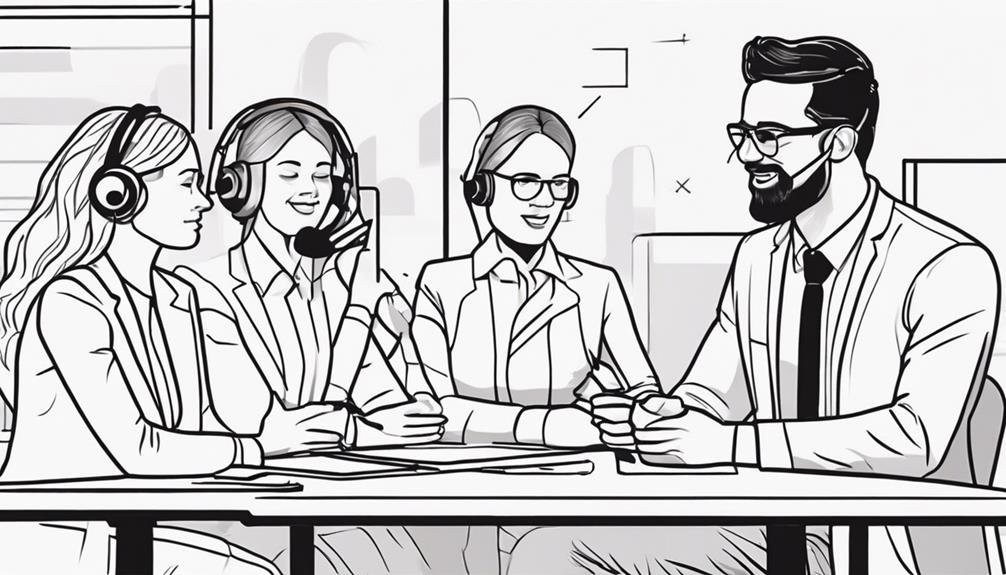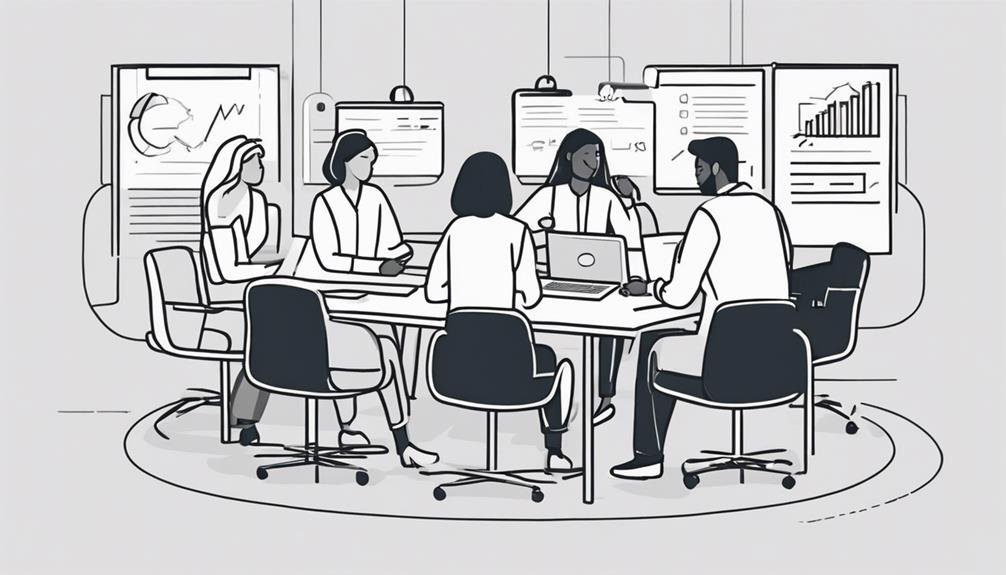To excel in any job, you must develop essential teamwork skills like communication, active listening, conflict resolution, respect, and accountability. Effective communication is key to team productivity and harmony. Actively listening fosters trust and understanding, while expert conflict resolution skills swiftly tackle issues and boost team performance. Respect in teamwork nurtures a positive atmosphere, preventing conflicts and encouraging diverse viewpoints. Personal accountability maintains transparency and efficient problem-solving. Mastering these skills will establish a solid foundation for successful teamwork in any workplace.
Key Takeaways
- Effective communication for productive team building and conflict prevention.
- Active listening to enhance trust, understanding, and open communication.
- Conflict resolution skills for efficient problem-solving and collaboration.
- Respectful interactions to maintain a positive work environment and prevent conflicts.
- Accountability in acknowledging mistakes, proactive problem-solving, and ensuring team efficiency.
Communication Skills

When it comes to teamwork, communication skills play a vital role in ensuring a smooth and efficient collaborative process. Effective communication skills are necessary for building a productive team where members work towards common goals. Clear expression helps in preventing conflicts and misunderstandings, fostering a positive work environment. Balancing communication is key to maintaining healthy team dynamics; it is about finding the right frequency and tone to keep everyone informed without overwhelming them. Strong communication skills are essential not only for conveying ideas but also for mediating conflicts and promoting collaboration. By enhancing understanding among team members, communication skills lay the groundwork for successful teamwork. They enable problem-solving, decision-making, and ultimately, achieving shared objectives. Essentially, honing your communication skills is an investment in creating a more cohesive and efficient team that thrives on effective collaboration.
Active Listening Skills
Enhancing teamwork requires mastering the art of active listening. Active listening involves more than just hearing; it entails fully focusing on what others are saying without distractions. Using body language and gestures while listening can demonstrate your engagement and understanding. Confirming understanding by paraphrasing what you heard helps avoid miscommunications and ensures clarity in communication. This skill not only enhances comfort and trust within a team but also plays a crucial role in effective collaboration. By actively listening, you create an environment where everyone feels heard and valued, fostering a culture of open communication and mutual respect.
| Active Listening Skills | Benefits |
|---|---|
| Focusing on speaker without distractions | Enhances comfort and trust within the team |
| Using body language and gestures | Shows engagement and understanding |
| Confirming understanding by paraphrasing | Avoids miscommunications |
| Key for effective communication and collaboration | Fosters open communication and mutual respect |
Conflict Resolution Skills

To navigate effectively through the complexities of team dynamics, mastering conflict resolution skills is essential. Conflict resolution skills are critical for addressing issues promptly within a team environment. By actively listening and engaging in problem-solving, conflicts can be resolved efficiently. Active listening without judgment is a fundamental aspect of effective conflict resolution, allowing team members to feel heard and understood. Negotiation plays a significant role in finding compromises that are respectful and beneficial to all parties involved. Developing healthy conflict resolution skills not only helps prevent conflicts from escalating but also encourages new ways of working together. These skills enhance teamwork, collaboration, and overall team performance. In a collaborative setting, strong interpersonal skills and effective communication are crucial for successful conflict management. By honing conflict resolution skills, you pave the way for a more cohesive and productive team dynamic.
Respect in Teamwork
Mastering regard in teamwork is a vital component that complements conflict resolution skills. In a team setting, focusing on solutions rather than arguments cultivates a positive work environment. When working within a group, approaching disagreements openly and constructively is essential to prevent conflicts from escalating. Providing constructive feedback and refraining from emotional reactions are necessary skills that demonstrate regard in teamwork. Respecting people's differences and embracing diverse perspectives contribute to effective collaboration within the team. By promoting open lines of communication and honoring diversity, regard in teamwork fosters growth and progress. Creating a culture of regard not only enhances the team dynamics but also guarantees a positive work environment where individuals feel valued and heard. Embracing regard as a core value within the team leads to improved relationships, increased productivity, and overall success in achieving common goals.
Accountability in Teamwork

A key aspect of successful teamwork is accountability. Accountability in teamwork involves acknowledging mistakes and assuming responsibility for errors to prevent conflicts. It is essential for fostering trust and open communication within a team dynamic. Being accountable in teamwork means honest communication and proactive problem-solving to maintain team efficiency. Taking ownership of tasks and being transparent about progress helps set the team up for smoother workflows. Accountability in teamwork is about holding oneself and others responsible for their actions and commitments to achieve common goals.
- Acknowledge mistakes: Be open about errors to prevent conflicts.
- Foster trust: Accountability builds trust and open communication.
- Proactive problem-solving: Take responsibility for finding solutions to maintain team efficiency.
- Transparency: Be open about progress to ensure smoother workflows.
- Common goals: Hold yourself and others accountable for actions and commitments towards shared objectives.